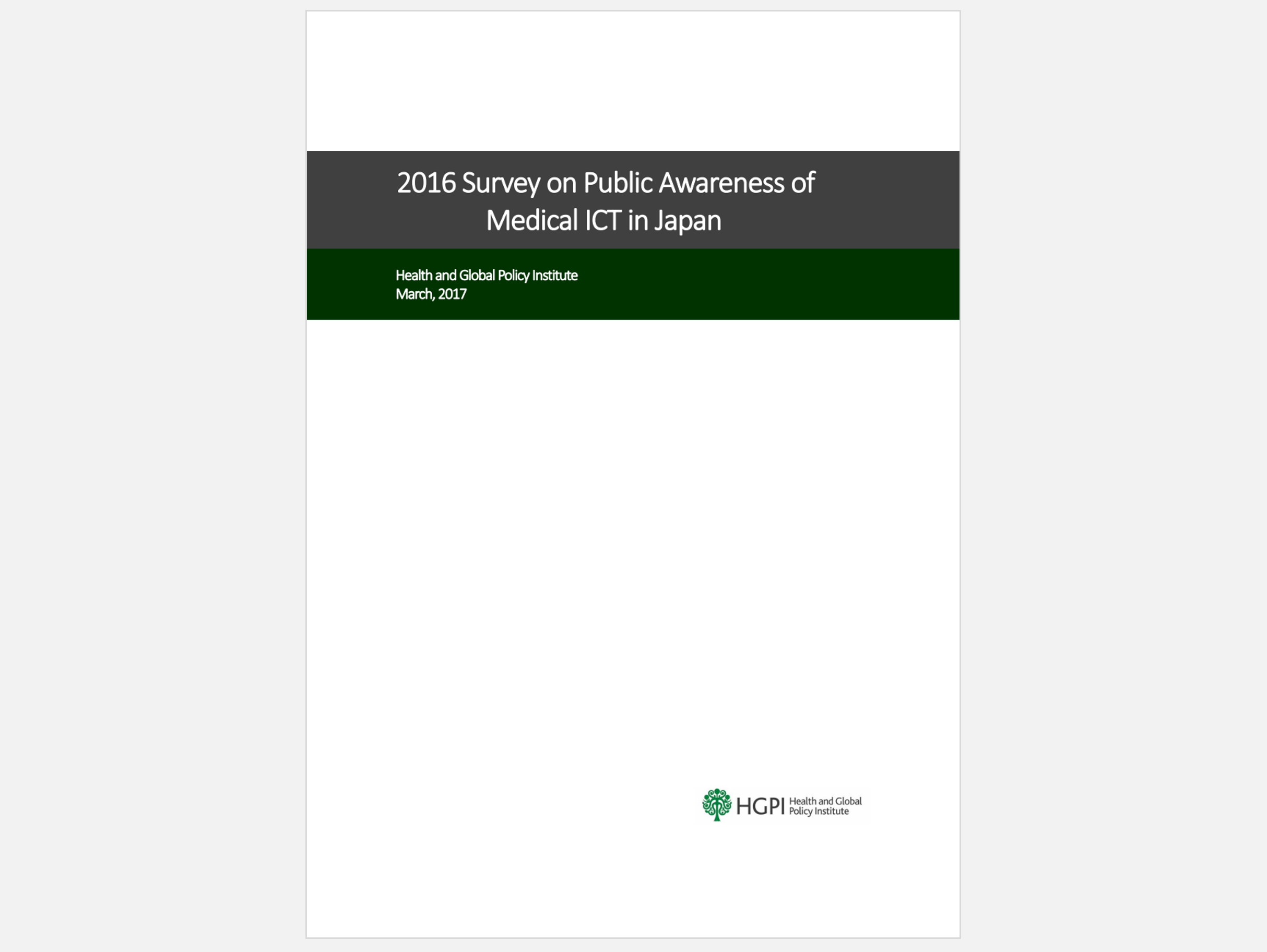(Research Report) 2016 Survey on Public Awareness of Medical ICT in Japan (March 28, 2017)
date : 3/28/2017

Since 2006, HGPI has been conducting surveys to grasp public need and awareness about health care systems and policies.
This year’s survey was conducted in November and December on the public awareness of Information and Communication Technology (ICT) in medicine. Specifically, the survey asked about the public opinion on telemedicine, the application of artificial intelligence in medicine, and personal medical data management, and the results revealed some important points which can be incorporated in Japan’s healthcare policy in the future.
Summary of Results
- More than half of untreated chronic disease patients in a stable condition supported telemedicine. 58% of those untreated patients believe that telemedicine can reduce the frequency of hospital visits, which makes it easier to commit to continuous long-term treatment.
- The causes for interrupting long-term treatment included: 1. The trouble of making frequent hospital visits; 2. Changes of environment; and 3. Cost. Additionally, participants with a yearly income of 4 million yen or less answered that the cost of treatment was the largest burden in committing to long-term treatment.
- Younger survey participants were willing to cooperate with Government-run health and medical data collection and management initiatives, whereas the older generation was more willing to contribute to data collection conducted by institutions other than the Government, such as hospitals and non-profit organizations.
Conclusions regarding the application of ICT in medicine
- Telemedicine has the potential to reduce the risk of interruptions in long-term chronic disease treatments. It is also important to consider ways to reduce the cost burden placed on individual patients, as cost is sometimes a reason why people discontinue treatment.
- The definition of telemedicine is broadening from healthcare that uses telephones to serve patients receiving long-term treatment living in areas with limited resources to healthcare that utilizes advanced communication technology such as video calls and chat services.
- There is a fairly large gap between generations in their opinions on medical data management. Nevertheless, it is crucial that a method of data management that suits the social values and habits of the next generation be established.
For more detailed information on the survey, please refer to the PDF file.
Top Research & Recommendations Posts
- [Policy Recommendations] The Path to a Sustainable Healthcare System: Three Key Objectives for Public Deliberation (January 22, 2026)
- [Research Report] The 2025 Public Opinion Survey on Healthcare in Japan (March 17, 2025)
- [Research Report] Perceptions, Knowledge, Actions and Perspectives of Healthcare Organizations in Japan in Relation to Climate Change and Health: A Cross-Sectional Study (November 13, 2025)
- [Research Report] The 2023 Public Opinion Survey on Satisfaction in Healthcare in Japan and Healthcare Applications of Generative AI (January 11, 2024)
- [Policy Recommendations] Reshaping Japan’s Immunization Policy for Life Course Coverage and Vaccine Equity: Challenges and Prospects for an Era of Prevention and Health Promotion (April 25, 2025)
- [Policy Recommendations] Developing a National Health and Climate Strategy for Japan (June 26, 2024)
- [Policy Recommendations] Achieving Equity in Multidisciplinary Pain Treatment and Support Systems for Pain Management (March 31, 2023)
- [Research Report] Survey of Japanese Physicians Regarding Climate Change and Health (December 3, 2023)
- [Public Comment Submission] “Assessment Report on Climate Change Impacts in Japan (Draft Overview)” (December 24, 2025)
- [Research Report] The Public Opinion Survey on Child-Rearing in Modern Japan (Final Report) (March 4, 2022)
Featured Posts
-
2026-01-09
[Registration Open] (Hybrid Format) Dementia Project FY2025 Initiative Concluding Symposium “The Future of Dementia Policy Surrounding Families and Others Who Care for People with Dementia” (March 9, 2026)
![[Registration Open] (Hybrid Format) Dementia Project FY2025 Initiative Concluding Symposium “The Future of Dementia Policy Surrounding Families and Others Who Care for People with Dementia” (March 9, 2026)](https://hgpi.org/en/wp-content/uploads/sites/2/dementia-20260309-top.png)
-
2026-02-05
[Registration Open] (Webinar) The 141st HGPI Seminar “Current Status and Future Prospects of Korea’s Obesity Policy: Voices of People with Lived Experience in Policy Promotion” (March 3, 2026)
![[Registration Open] (Webinar) The 141st HGPI Seminar “Current Status and Future Prospects of Korea’s Obesity Policy: Voices of People with Lived Experience in Policy Promotion” (March 3, 2026)](https://hgpi.org/en/wp-content/uploads/sites/2/hs141-top-1.png)
-
2026-02-06
[Research Report] AMR Policy Update #5: Cancer Care and AMR (Part 2)
![[Research Report] AMR Policy Update #5: Cancer Care and AMR (Part 2)](https://hgpi.org/en/wp-content/uploads/sites/2/HGPI_20260204_AMR-Policy-Update-5.png)




